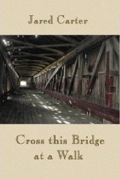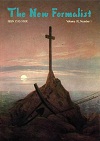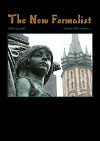We've Got a Problem
Whoever sent Pete Innes for the beer
was crazy, man, I could’ve told you so.
I think we’ve got ourselves a problem here.
It’s been a long dry spell, and God knows we’re
all tired of reruns and the late night show.
Whoever sent Pete Innes for the beer?
I’ll give you ten to one he’s at The Pier
chugging his way to history on our dough;
I think we’ve got ourselves a problem here.
Poor old Joe Schultz, who died sometime last year,
sits waiting like a propped-up domino.
We need to send Pete Innes for the bier.
Come on, you guys, by now it should be clear:
Pete may be dry, but not as dry as Joe,
I think. We’ve got ourselves a problem here.
I say it’s time we get our ass in gear
and bring him back. Somebody’s got to go—
whoever sent Pete in. As for the beer,
I think we’ve got ourselves a problem here.
I never thought Pete Innes, sent for beer,
would bring it back. That’s why I had to go
and see what’s in his locker at The Pier.
You hang around a guy, you start to hear
a lot of things you wish you didn’t know.
I never thought Pete Innes went for beer.
It’s nothing new for him to disappear;
he turned up missing several years ago
before he leased the locker at The Pier.
Yet when he took the money box last year
and said he’d see us in an hour or so,
I never thought. Pete Innes, sent for beer,
was Don Quixote off to the frontier
or Davy Crockett at the Alamo.
To see what’s in his locker at The Pier
was not my business, nor to interfere
with those two guys he left with, even though
I never thought Pete innocent. Forbear
to see what’s in his locker at The Pier.
The night Pete Innes went to get the beer
is legend now, and grows as legends grow.
The tale gets more bizarre with every year.
You want the truth, you have to get it here.
I found him, but I never found the dough.
The night Pete Innes went to get the beer
somebody must have jumped him from the rear.
We sat there dry; the bastard didn’t show.
The tale gets more bizarre with every year.
I pried his locker open at The Pier.
They say I found him—well, that’s partly so.
The night Pete Innes went to get the beer
they say his throat was cut from ear to ear,
the rest was gone. They keep their voices low;
the tale gets more bizarre with every year.
They say the fish have hiccups in the weir;
the wind smells rummy, but I wouldn’t know.
The Night Pete Innes Went to Get the Beer:
The tale gets more bizarre with every year.
The Hobo
Deep in the vast Missouri’s slimy silt
there lies what was a man. He has been dead
these seven decades, and his flesh has fed
huge catfish and a boxcar rider’s guilt.
There were no jobs. My uncle slept in trains
that ran along the river in KC
where hoboes gathered. It was here that he
jumped from a car and panic filled his veins
as someone stepped from shadow. It was here
he pulled his gun and dropped the man forever.
Quickly he rolled the body to the river
and watched it sink. He lived in guilt and fear
from that day forward, dreamed of Cain and Abel.
Who was the man? Who missed him at the table?
—From Blue Collar Sonnets
Plumbers
Up to their shins in human nastiness
of every ugly kind, how do they keep
from choking on their vomit when they sleep?
How do they free their nostrils of the mess
and find their appetites at dinner hour?
Do they just wash their hands of all of it,
the hairballs and the condoms and the shit,
and think of lilacs while they’re in the shower?
These are the men we call when septic tanks
rebel, when sewer lines regurgitate
their stinking contents. They investigate
our murky underworld for little thanks
beyond their union scale, but when they’re through
they know more secrets than the tabloids do.
—From Blue Collar Sonnets
The Molly Maguires
Oh yes, our hands were bloody, but in part
from lifting murdered brothers off the ground.
We came to this great promised land and found
that we were beasts of burden, saw the heart
of Ireland being trampled in the mud
by ruthless men who broke us, showed us hell
and left our shriveled bodies where they fell.
I’ll not deny we shed some rich men’s blood.
We wanted schools and doctors, shoes and bread.
We got betrayal, treachery and filth
while villains bribed our priests with tainted wealth
and winked at murderers who blamed their dead
on Mollies. It was perjured oaths alone
that hanged us not for our crimes but their own.
—From Blue Collar Sonnets



